Old Chinatown and satay men: Why this couple collects nostalgic Singapore art
Su-Yen Wong and Fermin Diez’s collection of paintings by pioneering Singapore artists is their way of safeguarding a piece of the little red dot’s history.
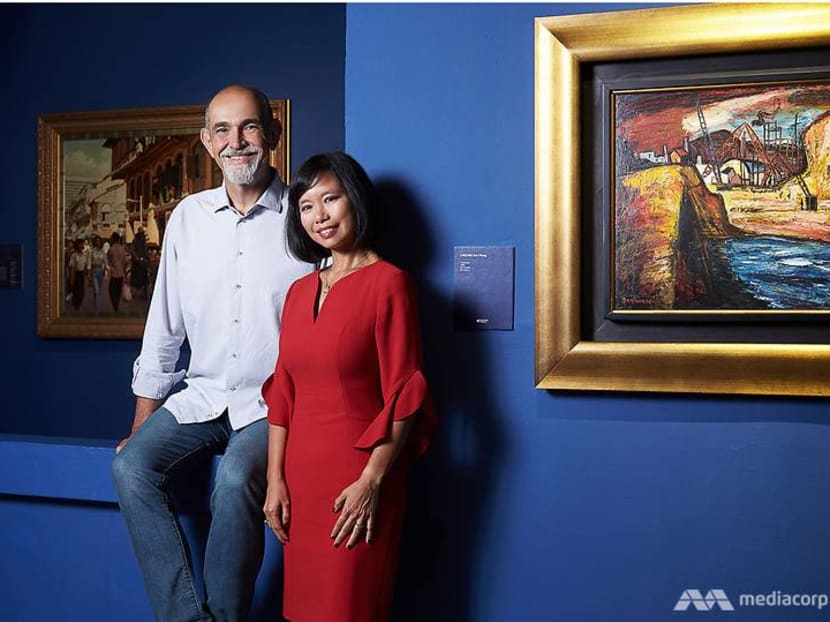
Art collectors Su-Yen Wong and Fermin Diez at The Private Museum on March 27, 2020. (Photo: Kelvin Chia)
Pop quiz: Do you know what drawings are depicted on the back of Singapore’s S$50 note? Some might vaguely recall seeing Chinese ink images of “monkeys”, others may not have even noticed any art on the note. But rare is the individual who can name and identify Chen Wen Hsi’s Gibbons. Even rarer is the person who might point out that there is in fact another work of art printed on the same S$50 bill – Drying Salted Fish by Cheong Soo Pieng.
Unfortunately, although Chen and Cheong are two of Singapore’s most lauded pioneering artists, they are far from household names in the country. It is something that husband and wife duo Su-Yen Wong and Fermin Diez hope to change with their art collection they have lovingly built up over the past 13 years.
“I feel that this group of first and second generation artists are a bit under-appreciated. People who know art will recognise these names but ‘non art people’ wouldn’t because we do not have this knowledge of Singapore art history and appreciation embedded in our culture,” said Wong, a professional speaker and board director. “I would say that if we were to add a piece to the Singapore art ecosystem, that would be education.”
To encourage this appreciation for art by Singapore’s pioneering painters – and to offer the public the opportunity to indulge in a nostalgic walk down memory lane in these times of COVID-19, the couple have loaned 27 pieces from their collection for an exhibition at The Private Museum.
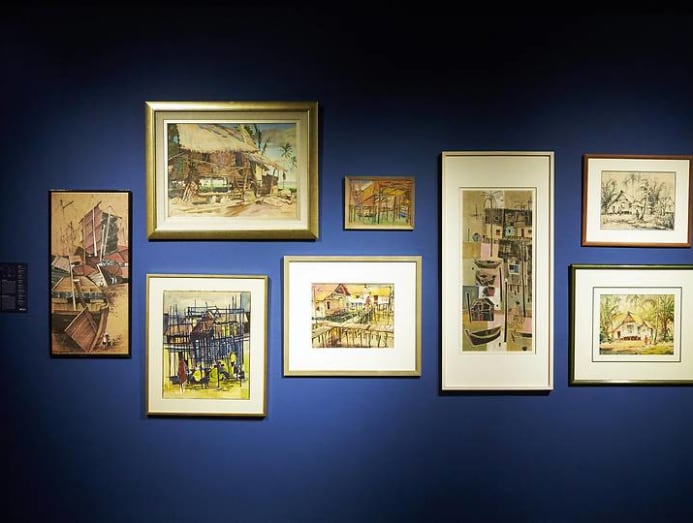
Titled Silhouettes: Collecting Singapore Modern, the exhibition features modern masterpieces by Chen, Cheong as well as other Singapore greats including Chua Mia Tee and Lim Cheng Hoe. The chosen works depict daily life and street views of an old Singapore that have now been replaced with skyscrapers and glittering malls.
To comply with the latest measures by the Singapore government, the museum will be closed until May 4. There are plans to implement a virtual viewing experience and the exhibition will be extended when government directives are lifted.
READ> Culture from the couch: Museum tours, concerts and plays to enjoy from home
“Art is not a high-falutin’ thing, it is about exposing people and preserving culture in an accessible manner.” – Su-Yen Wong
For the couple, both of whom are long term art collectors, this tightly curated approach to their joint art collection is a way for them to safeguard a piece of Singapore’s history.
“I have always had a fascination with old scenes, like what you might see on [photos that line the basement of] The Fullerton Hotel as I think these images give us a sense of roots,” said Wong, whose father was an avid Chinese art collector and instilled in her a love for art. As a child, she and her sister studied under Singapore artist Liu Kang. Her sister is now a professional artist but Wong says with a laugh that she prefers to be a “spectator”.
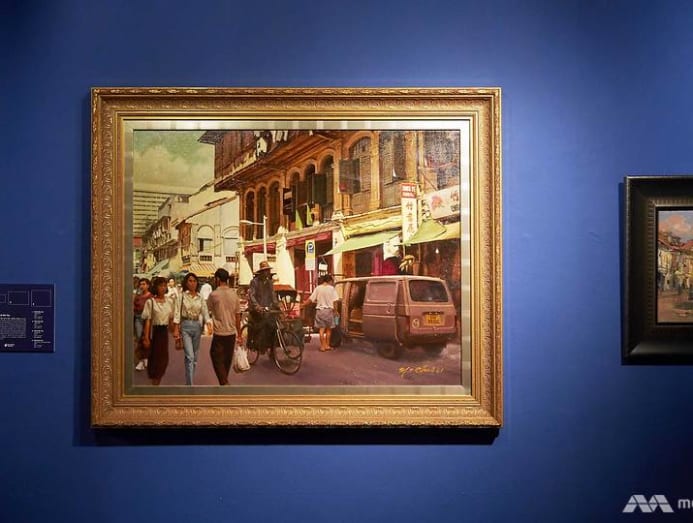
Human resources professional Diez, who is originally from Venezuela, first saw these old scenes of Singapore in a postcard book that Wong owns and was amazed that they no longer exist today.
“I was fascinated by how quickly history was being overrun by modern Singapore,” he said. “Then I found out that there were various artists who had captured this old Singapore by going out there and painting it. What is so fascinating to me is that each artist has his own way of interpreting the same place.”
“I was fascinated by how quickly history was being overrun by modern Singapore. Then I found out that there were various artists who had captured this old Singapore by going out there and painting it.” – Fermin Diez
They co-acquired their first work, Country Road by Cheong in 2007 and have since been acquiring a diverse selection of art that showcase these nostalgic scenes of the country. “Our focus has been around first and second generation artists who captured the life and times of Singapore as it was at that time,” said Wong.
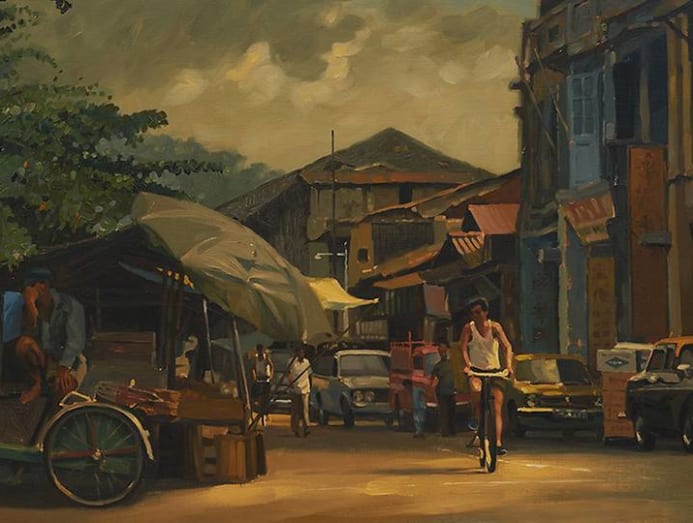
Since then, their art acquisition journey has led them on an adventure of sorts through Singapore’s past, where they have even had the chance to hear tales about the origins of their art from the artists in person.
“We have a picture with Ong Kim Seng with one of his paintings, where he talked to us about trying to preserve these scenes of Singapore. Another time, we met Tong Chin Sye, who told us what happened on the day he went to Tanjong Rhu to work on another painting,” Diez said.
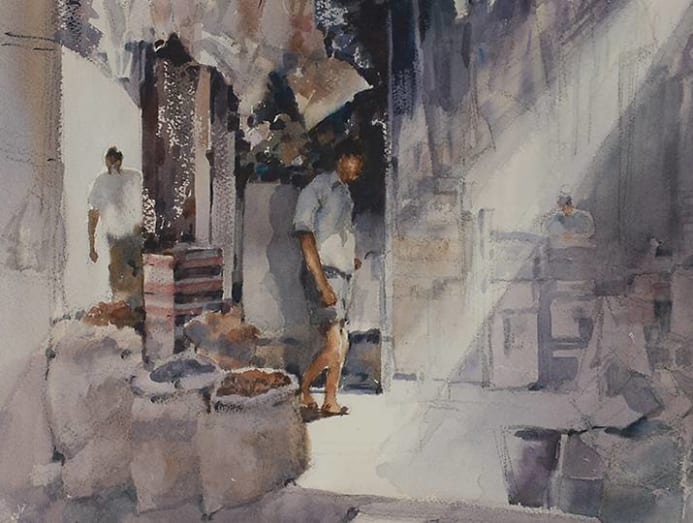
These vignettes are what makes the art come to life for them. With many of the second generation artists already in their 80s and 90s, the couple are aware that time is running out for these painters to tell their stories. This is why one of their bucket list goals is to write a book that chronicles these memories for posterity.
“Art is not a high-falutin’ thing, it is about exposing people and preserving culture in an accessible manner,” said Wong.
They are already in a good position to make this happen. While they do not know the exact number of artworks in their collection, they do own unique pieces that are highly sought after. In 2018, they loaned four paintings by watercolour artist Lim Cheng Hoe to the National Gallery for an exhibition. One of the pieces, Boats in the Singapore River, set an artist record for the highest amount paid for his work, when they acquired it at a Christie’s Singapore auction for HK$200,000 (S$37,000).
Still, in comparison to contemporary art from other countries such as Indonesia or China, prices of Singapore art are “not at the same level”, they observed. Plus, they had the foresight to start building their collection more than a decade ago when there were even fewer Singapore art aficionados. “Prices have come up quite a bit since then,” Wong observed.
Regardless of the price tag, their pieces are more than pretty pictures to them. Said Diez, “If you look at art as a wall decoration, then it would be an expensive decoration. But this is owning a piece of Singapore history.”





